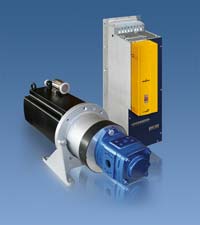
Machine processes for injection molding and pressing operations require more power than almost any other industrial application. For this reason, hydraulic power transmission has been the traditional choice in these applications. However, conventional solutions for pressure control have proven to be energy inefficient. That is why Baumüller has turned to servo-based controls. The use of servo pumps can reduce energy consumption by up to 80 percent.
The constant rise in fuel prices in recent years has made energy efficiency an ever more important consideration, and has led machinery and equipment manufacturers to contemplate new solutions. Such rethinking is especially needed for injection molding and pressing machines since their power requirements can fluctuate widely during the production process. For example, closing and injecting operations require greater amounts of hydraulic oil and thus a much higher flow rate than during dwell pressure application, which involves high pressure but a low flow rate.
Traditionally, machines are controlled either by valve-controlled drives, consisting of a standard motor and constant pump, or by electro-hydraulic variable pumps, which are also driven by a standard motor. Both solutions have the same disadvantage: the motor-pump combination operates at full speed 100% of the time and therefore does not adequately allow for the strong fluctuation in the machine's power requirements. This results in very inefficient energy use in the partial load range, and significantly increases the energy and life-cycle costs of the machine.
Increased energy efficiency through the use of servo pumps
Baumüller, the Nuremberg-based specialist for automation and drive solutions, is combining the advantages of hydraulic power transmission with those of electrical power control by means of servo technology: The use of a servo drive means that the speed of a constant pump can be controlled dynamically and with higher accuracy. The high efficiency, low heat development, above-average dynamic response, high precision, and significantly reduced noise emission of the servo technology is particularly impressive. By contrast, the hydraulic power transmission scores through its high power densities, low inertias, and robust and cost-effective drive elements.
The use of a servo pump enables significant reduction in energy use, typically over 30 percent compared to conventional solutions. During extended phases with very low power demand, energy savings up to 80 percent are possible.










